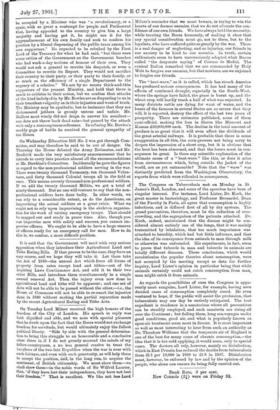On Tuesday Lord Milner received the high honour of the
freedom of the City of London. His speech in reply was both dignified and able, and we note with special pleasure that he dwelt upon the fact that the Boers would not exchange freedom for servitude, but would ultimately enjoy the fullest political liberty. " Side by side with the general determina- tion to bring this struggle to an honourable and a conclusive close there is, if I do not greatly misread the minds of my fellow-countrymen, a no less general resolve to treat the burghers of the two late Republics when the war is over with such fairrIss, and even with such generosity, as will help them to accept the position, du d, in the long run, to acquire the sentiment, of British citizenship. We must show them—we shall show them—in the noble words of Sir Wilfrid Laurier, that, if they have lost their independence, they have not lost their freedom." That is excellent. We like not less Lord Milner's reminder that we must beware, in trying to win the hearts of our former enemies, that we do not alienate the con- fidence of our own friends. We have always held the necessity, while treating the Boers humanely, of making it clear that any special consideration must go, not to them, but to the loyalists, who have suffered quite as greatly by the war. There is a real danger of neglecting, and so injuring, our friends in our anxiety to be kind to our enemies. In truth, certain enthusiasts seem to have unconsciously adopted what Bacon called " the desperate saying" of Cosimo de Medici. The cynical Italian remarked that we are commanded by Holy Writ to forgive our enemies, but that nowhere are we enjoined to forgive our friends.


































 Previous page
Previous page